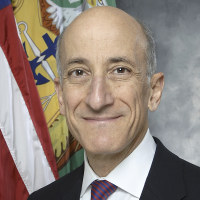Chairman of the Commodity Futures Trading Commission: Who is Tim Massad?

On November 12, 2013, President Barack Obama nominated Timothy G. Massad to be chairman of the Commodity Futures Trading Commission. That panel oversees the trade of derivatives, the complex financial instruments that some say helped intensify the 2008 financial crisis.
Massad was born July 30, 1956, in New Orleans, one of three children. His father, Alexander Hamilton Massad, was an executive for Mobil, eventually rising to become an executive vice president and a member of Mobil’s board of directors from 1977 to 1986. He was also a director of the Ingersoll Rand Corporation from 1982 to 1996.
In 1968, Tim’s parents moved to Connecticut and in 1974 he graduated from Darien High School.
Harvard was Massad’s next stop. While there, he was politically active and became a member of a committee supporting a boycott of textile maker J.P. Stevens over its labor practices. Massad graduated with a bachelor’s in social studies in 1978. After graduation, Massad went to Washington to work for consumer activist Ralph Nader. Massad began to believe those in the fight against corporate influence knew little of that world, so he returned to Harvard to study law. Massad helped organize a student protest of Harvard Law’s grading policy and rules on professors’ outside activities. He received his J.D. from that school in 1984.
That same year, he helped organize the New York Citizens' Utility Board, which advocated on behalf of utility customers.
After his graduation from Harvard Law, Massad joined the law firm of Cravath, Swaine & Moore, where he would spend the next 25 years, becoming a partner in 1991. His emphasis was in securities law, and he often worked overseas, serving in Hong Kong (1998-2002) and London and leading the firm’s India practice in 2007. Massad also represented UNICEF and Covenant House as pro-bono clients. In 1988, he took a leave from the firm to manage Michael Dukakis’ Connecticut presidential campaign.
Massad dipped his toe into government work in 2008, when a friend, Damon Silvers, was on a Congressional committee reviewing the bank bailout. Massad was asked to help write reports on the Troubled Asset Relief Program (TARP), which he agreed to do. In May 2009, Massad left Cravath and joined TARP as chief counsel, a position he held for 16 months.
By the end of 2010, Massad was acting assistant secretary of the Treasury for Financial Stability, which gave him supervision over TARP. He was confirmed as assistant secretary on June 30, 2011. In that post, he started to wind down the program, selling assets the federal government had taken in exchange for funding banks and other financial institutions during the 2008 crisis. Despite its unpopularity with many Americans, the program made money for taxpayers under Massad’s stewardship.
Massad and his wife, Charlotte Hart, have two children, Emil and Jayne. Massad enjoys French cooking and early in his legal career was a volunteer apprentice at the Bouley restaurant in Manhattan. He also held baking contests while at the Treasury Department.
Before he joined the Obama administration, Massad was a heavy contributor to Democratic election campaigns. He gave $35,400 to Obama in 2008, $69,500 to the Democratic National Committee between 1996 and 2008, and $11,500 to the Democratic Senatorial Campaign Committee. He also contributed to the campaigns of John Kerry, Chuck Schumer, Hillary Clinton, Al Franken and Bill Clinton.
-Steve Straehley
To Learn More:
Tim Massad: Washington's Most Powerful Money Manager? (by Luke Mullins, Washingtonian)
Tim Massad (Washington Post)
- Top Stories
- Unusual News
- Where is the Money Going?
- Controversies
- U.S. and the World
- Appointments and Resignations
- Latest News
- Musk and Trump Fire Members of Congress
- Trump Calls for Violent Street Demonstrations Against Himself
- Trump Changes Name of Republican Party
- The 2024 Election By the Numbers
- Bashar al-Assad—The Fall of a Rabid AntiSemite






Comments